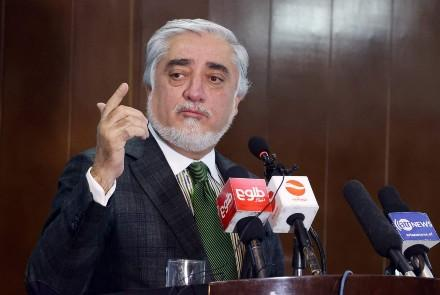Abdullah Offers Prisoners, Removal from Blacklist to Taliban

Abdullah said the opportunity for peace should not be wasted, and concessions could be made if the Taliban committed to an agreement.
Chairman the High Council of National Reconciliation (HCNR) Abdullah Abdullah on Wednesday said that several opportunities for bringing peace in the country have been lost, stating that the country can’t afford the current opportunity for peace to be wasted.
Abdullah said that all Taliban prisoners will be freed, and the names of the Taliban’s members will be removed from the UN blacklist after the Taliban agree to peace.
“We have lost a lot of opportunities, if these opportunities (current talks in Doha) are wasted, then we will not have much time to work—every single day, the people are sacrificed due to the prevailing war,” said Abdullah.
This comes amid a reported stalemate in the talks between the peace delegations from the Islamic Republic of Afghanistan and the Taliban in Doha.
Sources familiar with the peace talks in Doha have said that the Taliban is reluctant for peace talks due to a lack of international guarantees about the release of their remaining prisoners and the removal of names of their leaders from the UN blacklist.
“They (Taliban) want the US to release their 7,000 prisoners and remove their names from the blacklist … the republic side insists on a ceasefire, but the Taliban wants to announce a ceasefire about the talks,” said Faiz Mohammad Zaland, a university lecturer.
“We are closer to a peace, the release of the prisoners and removal from the blacklist will be part of an agreement,” said Abdullah Abdullah, the head of the peace council.
But Afghan National Security Adviser Hamdullah Mohib has said that the release of 5,000 Taliban prisoners as part of the US-Taliban peace deal has led to further intensification of war in the country.
Mohib alleged that those released from the jails have returned to the battlefields.
“We have credible information that those released from the jails are now making car bombs to kill the people, then why we should release their prisoners, we will not do it at any cost,” said Mohib.
Nevertheless, Habiba Sarabi, a member of the peace negotiating team representing the Islamic Republic of Afghanistan in the talks with the Taliban, said that all gains made by the Afghans in the past two decades will be preserved at the talks.
“We will not compromise on the gains that we have made in the past two decades,” said Sarabi.
Nader Nadery, a member of the peace negotiating team representing the Islamic Republic of Afghanistan in the talks with the Taliban, has accused the group of not showing interest in attending the formal meetings to end the war in the country over the past nine days.
“Peace and ending the violence are our people and our government’s top priority. To achieve this noble goal the peace negotiation team of the Republic is committed and present in Doha. Nine days that formal meetings are not held and the other side is not willing to engage in talks to end the conflict and save lives,” tweeted Nadery.
Meanwhile, the Taliban’s deputy leader Mullah Abdul Ghani Baradar arrived in Tehran on Tuesday where he is meeting top Iranian officials, including Foreign Minister Mohammad Javad Zarif.
Baradar on Wednesday met Iran’s National Security Adviser Ali Shamkhani.
Iranian media reports have said that Shamkhani in a meeting with the Taliban’s visiting delegation has clarified that Iran will not recognize a government in Afghanistan that comes through military pressure and war.
“The Taliban are busy with foreign trips instead of talking peace, this indicates that the Taliban is not committed to talks and peace and they do not care to continue the killings of the people,” said Rahmatullah Andar, a spokesman for the ONSC.
Abdullah Abdullah has said that the Taliban’s trip to Tehran was carried out in harmony with the Afghan government.
Abdullah stated that Iranian officials have been asked to persuade the Taliban for a ceasefire and to settle the disputed issues with the Afghan government.
